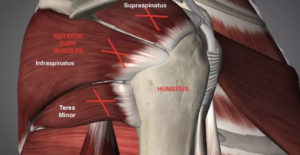CORE Physical Therapy Omaha Explains…
By Dr. Anthony O’Donnell PT DPT
CORE Physical Therapy and Sports Performance PC
17660 Wright St. 9/10
Omaha NE
402-933-4027
How effective are isometric exercises for rotator cuff tendinopathies?
What this is?
Is a condition in which there is an injury to the tendon to one of the four rotator cuff muscles (Supraspinatus, Infraspinatus, Teres minor, and Subscapularis) in which is exacerbated with mechanical loading.
Common symptoms of RC tendinopathy is described having pain in the shoulder, especially when performing overhead movements.
What can cause this?
This condition is typically caused by increased loading outside of an individual’s current physiological capacity
Common in over head athletes such as pitcher’s, weightlifters, etc.
Studies show
That there is no significant difference between performing isometric exercises, concentric/eccentric, or solely eccentric exercises for the treatment of tendinopathies. Due to the individualistic nature of this condition it is important to get a physical therapist to specifically treat your RC tendinopathy based upon your individual characteristics including activity level, mechanism of injury, personal response to loading, etc.
There are many conditions that can cause your ailments. There are also many ways to treat during active training of any shoulder pain or pathology.
https://www.ncbi.nlm.nih.gov/pmc/articles/PMC7406028/
Effectiveness of isometric exercise in the management of tendinopathy: a systematic review and meta-analysis of randomised trials
Objective
To systematically review and critically appraise the literature on the effectiveness of isometric exercise in comparison with other treatment strategies or no treatment in tendinopathy.
Design
A systematic review and meta-analysis of randomised controlled trials.
Data sources
Electronic searches of Medline, Cumulative Index to Nursing and Allied Health Literature, EMBASE and Cochrane were undertaken from inception to May 2020.
Methods
Overall quality of each study was determined based on a combined assessment of internal validity, external validity and precision. For each outcome measure, level of evidence was rated based on the system by van Tulder et al.
Results
Ten studies were identified and included in the review, including participants with patellar (n=4), rotator cuff (n=2), lateral elbow (n=2), Achilles (n=1) and gluteal (n=1) tendinopathies. Three were of good and seven were of poor overall quality. Based on limited evidence (level 3), isometric exercise was not superior to isotonic exercise for chronic tendinopathy either immediately following treatment or in the short term (≤12 weeks) for any of the investigated outcome measures. Additionally, for acute rotator cuff tendinopathy, isometric exercise appears to be no more effective than ice therapy in the short term (limited evidence; level 3).
Summary
Isometric exercise does not appear to be superior to isotonic exercise in the management of chronic tendinopathy. The response to isometric exercise is variable both within and across tendinopathy populations. Isometric exercise can be used as part of a progressive loading programme as it may be beneficial for selected individuals.
At CORE Physical Therapy in Omaha, We specialize in the treatment of athletes. We have worked with athletes for a combined 30 years. CORE was established in 2015 by Dr. Mark and Dr. Claire Rathjen is family owned and operated.
Proud winners of the Omaha Choice awards for 2016, 2017, 2018, 2019, 2020,2021
We are proud to serve the greater Omaha metro area.
For More information, Please feel free to contact us http://coreomaha.com/contact/
Please feel free to follow us at https://www.facebook.com/COREomaha/
To get started http://coreomaha.com/getting-started/
For more Blog information http://coreomaha.com/blog/
Youtube Account linked below.
https://www.youtube.com/channel/UCVg8OSN5h-i1n_ykw1Gvahg?view_as=subscriber


 2
2